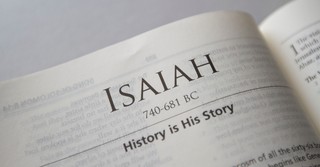A Closer Look at the Prophecies of Isaiah
Share

The book of Isaiah presents to us a rich and comprehensive view of the kingdom of Judah and Jerusalem. It speaks of much judgment, but it is also filled with messages of hope and restoration. It also contains some of the most beautiful and majestic language concerning the coming Kingdom Age. But if you think there is nothing to learn from this highly prophetic book, which is full of warnings and woe, think again!
Photo credit: ©SparrowStock
What Is Isaiah About?

The message of the book becomes clear as you read through its pages. Isaiah speaks a series of prophecies, calling out the sins of God’s people who were steeped in rebellion. From its opening verses Isaiah begins crying out to Judah:
“Woe to the sinful nation, a people whose guilt is great, a brood of evildoers, children given to corruption! They have forsaken the LORD; they have spurned the Holy One of Israel and turned their backs on him. Why should you be beaten anymore? Why do you persist in rebellion? Your whole head is injured, your whole heart afflicted. From the sole of your foot to the top of your head there is no soundness— only wounds and welts and open sores, not cleansed or bandaged or soothed with olive oil” (Isaiah 1:4-6).
This scathing indictment is then followed by a compassionate plea for the people to return to God:
“Wash and make yourselves clean. Take your evil deeds out of my sight; stop doing wrong. Learn to do right; seek justice. Defend the oppressed. Take up the cause of the fatherless; plead the case of the widow. ‘Come now, let us settle the matter,’ says the LORD. ‘Though your sins are like scarlet, they shall be as white as snow; though they are red as crimson, they shall be like wool. If you are willing and obedient, you will eat the good things of the land” (Isaiah 1:16-19).
With these words and a stroke of his pen, Isaiah sets the stage for this book. In the first thirty-nine chapters, we hear Isaiah condemning and confronting his own people for their open defiance against God. Beginning in chapter thirteen, and continuing for ten chapters, Isaiah unleashes a series of prophecies upon several nations, including Babylon (modern day Iraq), Assyria (parts of modern day Turkey and Iraq), Egypt and Arabia, among others.
Photo credit: Unsplash/Cassidy Rowell
The Message of Hope in Isaiah

The second half of Isaiah (chapters 40-66), takes on a softer tone. It is here that we read messages of hope, comfort, and salvation. Included in these chapters are prophecies pointing to Christ’s glory, His suffering, and His coming millennial Kingdom.
The book of Isaiah actually speaks more of the coming Messiah more than any other prophet, referring to Him over twenty times. And though Christ is never mentioned by name throughout, prophetically, there are host of other names that describe His character.
“There shall come forth a Rod from the stem of Jesse, and a branch shall grow out of his roots” (Isaiah 11:1).
“And in that day there shall be a Root of Jesse, who shall stand as a banner to the people; For the Gentiles shall seek Him, and His resting place shall be glorious” (Isaiah 11:10).
From these verses in Isaiah, we know Christ as The Root of Jesse, and The Branch, both indicating His earthly lineage to the Davidic Kingdom.
“Behold, My Servant shall deal prudently; He shall be exalted and extolled and be very high” (Isaiah 52:13).
Here we learn of Christ’s nature during His earthly ministry. Matthew tells us that Christ came to serve and not to be served (Matthew 20:28). Once again, the book of Isaiah is all about Jesus, more than any other book in the Old Testament.
Who Wrote Isaiah, and When?
In the opening verse of this book, Isaiah identifies himself as the sole writer of the book:
“The vision of Isaiah the son of Amoz, which he saw concerning Judah and Jerusalem in the days of Uzziah, Jotham, Ahaz, and Hezekiah, kings of Judah” (Isaiah 1:1).
Isaiah began his ministry at the close of the reign of king Uzziah, according to chapter six. History tells us that this took place at about 740 B.C. Not only does Isaiah identify himself, but he also tells us that his ministry takes place during the reign of four kings; namely, Uzziah, Jotham, Ahaz, and Hezekiah.
While not much is known of Isaiah apart from this book, some scholars believe that Hosea and Micah were his contemporaries.
Photo credit: Pexels/Tony James Andersson
What Do We Learn from the Book of Isaiah?

There is a fascinating interlude in chapter six that reads like a flashback of sorts. This is because we’ve already read five chapters of prophecies and judgments, when Isaiah then begins to speak of his call and commission. In the first several verses of chapter six, we learn several things about personal revival.
“And they were calling to one another: ‘Holy, holy, holy is the LORD Almighty; the whole earth is full of his glory.’ At the sound of their voices the doorposts and thresholds shook and the temple was filled with smoke. ‘Woe to me!’ I cried. ‘I am ruined! For I am a man of unclean lips, and I live among a people of unclean lips, and my eyes have seen the King, the LORD Almighty.’ Then one of the seraphim flew to me with a live coal in his hand, which he had taken with tongs from the altar. With it he touched my mouth and said, ‘See, this has touched your lips; your guilt is taken away and your sin atoned for.’ Then I heard the voice of the Lord saying, ‘Whom shall I send? And who will go for us?’ And I said, ‘Here am I. Send me!’” (Isaiah 6:3-8).
In verse three, we learn of the absolute holiness of God. This is the one attribute of God that can be said to stand out among all the rest. And even though His absolute holiness is difficult for us to fully comprehend because of our sinful limitations, we are struck by Isaiah’s response to being in his holy presence.
This causes me to ask the question, “What is my response to the holiness of God? Am I always aware of His presence? Am I even sensitive to His presence throughout my day?” In verse five, as he is in the presence of God’s holiness, Isaiah is immediately struck by his own sinfulness. May we ever be aware of His presence and our sinfulness.
From verse seven we learn that God forgives our sin as we bring it to Him. I’m reminded of 1 John 1:9 which tells us that if we confess our sins, he is faithful and just to forgive of our sins and cleanse us from all unrighteousness. This is what is taking place here in Isaiah.
Photo credit: Unsplash
Are We Ready to Serve Like Isaiah?

Finally, in verse eight we learn of Isaiah’s call and commission. We note that now that he is cleansed and forgiven, he is now ready and eager to serve. “Here am I; send me.” Are we ready?
In Isaiah chapter fifty-nine, we learn the high price of sin and rebellion:
“Surely the arm of the LORD is not too short to save, nor his ear too dull to hear. But your iniquities have separated you from your God; your sins have hidden his face from you, so that he will not hear” (Isaiah 59:1-2).
We learn from Isaiah that sin separates; let us never allow sin to have its way in our lives; it seeks our destruction.
We find in Isaiah one of the powerful verses in Scripture. It teaches us of the peace, power, and protection that every child of God has who places their trust in him.
“’No weapon forged against you will prevail, and you will refute every tongue that accuses you. This is the heritage of the servants of the LORD, and this is their vindication from me,’ declares the LORD” (Isaiah 54:17).
Why Should We Read Isaiah?
My mother has told me over and over again, that this is her favorite book in the Bible. Can you see why? Isaiah is filled with glory, grace, grandeur. It is to be read not only to gain a knowledge of Christ and His coming kingdom, but if we read it honestly, we will learn about ourselves, and the power of God to save, heal, and deliver.
Make time in your busy life to read the book of Isaiah; you will be blessed by it.
Related articles
What Does Isaiah 66:13 Mean by ‘As a Mother Comforts Her Child, So Will I Comfort You?’
Who Was Isaiah and Why Is He Important?
What is the New Heavens and New Earth Mentioned in Isaiah and Revelation?
Photo credit: ©Getty Images/Tinnakorn Jorruang
